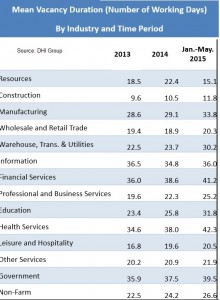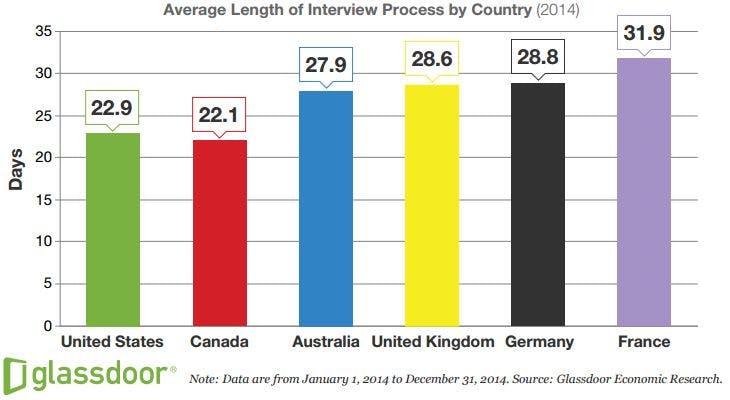It’s taking companies longer than at any time in the last 15 years — maybe even longer than ever — to fill a job, and that languor is losing them candidates.
Two recent reports on hiring put the average time from vacancy to offer at more than four weeks. And both studies — one from Glassdoor and the other from career site publisher DHI Group — say the time to fill is getting longer.
In the midst of a national recovery that has seen the unemployment rate go from a high of 10.1 percent to 5.3 percent in June, while the labor force continues to contract, Glassdoor found hiring time went from 12.6 days in 2010 to 22.9 days at the end of 2014.
Even when the data is scrubbed to control for changes in hiring location, industry mix, and other variables, Glassdoor found that interview time increased between three and four days.
 The monthly DHI-DFH National Mean Vacancy Duration says it took an average of 28 working days (which includes Saturdays) to fill a job in May. In just one year, the average increased by 3.3 days. In some industries the average is even higher. For health services jobs the average is 42.3 days; financial services jobs average 41.2 days.
The monthly DHI-DFH National Mean Vacancy Duration says it took an average of 28 working days (which includes Saturdays) to fill a job in May. In just one year, the average increased by 3.3 days. In some industries the average is even higher. For health services jobs the average is 42.3 days; financial services jobs average 41.2 days.
Recruiters at one of the largest search agency networks in the world say this hiring slowness is costing employers candidates. It’s a candidate-driven market, say 9-out-of-10 recruiters, yet too many employers drag their heels on hiring or make low ball offers.
The survey of the independent recruiters at MRI Network agencies says the leading reason why a job offer is turned down is because the candidate accepted another one.
Rejections are also coming sooner. The time between first interview to a rejected offer is four weeks or less, according to 63 percent of the recruiters. “Year-over-year data,” says the MRI report, “shows rejected offers after two weeks are on the rise, advancing six percentage points since the first half 2014 survey.”
 Commented one of the survey recruiters, “Employers have to realize candidates are truly a precious commodity in today’s market and they will not remain on the market very long. If they want the candidate, they have to aggressively pursue them in order to get them and keep them.”
Commented one of the survey recruiters, “Employers have to realize candidates are truly a precious commodity in today’s market and they will not remain on the market very long. If they want the candidate, they have to aggressively pursue them in order to get them and keep them.”
That’s not, however, what the recruiters see happening. Almost half of them (47 percent) say the biggest obstacle to hiring are salaries that are too low. When they find out during the interview, they simply withdraw.
Glassdoor’s analysis didn’t delve into job offers or rejection. Instead, it looked at 344,250 job interview reviews posted on the site between February 1, 2009 to January 31, 2015 to examine hiring time in the U.S. and five other countries. “Our findings suggest the job interview process has indeed grown significantly longer in recent years, both in the U.S. and around the world,” the report concludes.
Some causes of the longer hiring times are beyond the control of either job seeker or employer. For example, hiring is faster in Miami (18.6 days) than it is in Seattle (25 days). And smaller companies take less time to make a hiring decision than do larger ones.
One factor, however, is within an employer’s control, says Glassdoor: “The number and type of job interview screening methods chosen by company HR management. Of the nine job screening methods we examined, all have a positive and statistically significant effect on job interview durations.”
“Telephone interviews add 6.8 to 8.2 days; group panel interviews add 5.6 to 6.8 days; one-on-one interviews add 4.1 to 5.3 days; background checks add 3.1 to 3.4 days; and so on. In every case, additional layers of candidate screening add to hiring times,” according to the report.
